Here’s a quick look at some notable books—new titles from the likes of Charles Baxter, Dolores Reyes, and more—that are publishing this week.
Want to learn more about upcoming titles? Then go read our most recent book preview. Want to help The Millions keep churning out great books coverage? Then become a member today.
The Sun Collective by Charles Baxter
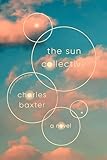 Here’s what Publishers Weekly had to say about The Sun Collective: “Baxter’s first novel in over a decade (after The Soul Thief) juggles satirical social critique and family drama, resulting in a messy yet engrossing tale of activism and aging. Retired Minneapolis engineer Harry Brettigan spends his days searching for his adult son, Tim, who fell out of touch months earlier, and sweetly bickering with his wife, Alma. After Alma faints one day, she starts talking with their pets and is drawn to the Sun Collective, a community group that offers resources to homeless people. There, she befriends a younger couple, Ludlow and Christina, and Harry balks when Ludlow details his homicidal vision for ‘effective microviolence’ against suburbanites to achieve the Sun Collective’s full potential. As Harry reckons with his relationships to Alma and Tim, he also travels down the rabbit hole of the Sun Collective to parse its true intentions; along the way, Tim reappears as a saved Collective member; the Sandmen, an extremist group that allegedly murders vagrants, emerge; and there’s a series of mysterious deaths. Throughout, Baxter smartly lampoons America’s political state and adds enough odd details to offset the occasionally murky plot threads. Readers willing to wade through the diversions will find a thoughtful study of anger, grief, and hope.”
Here’s what Publishers Weekly had to say about The Sun Collective: “Baxter’s first novel in over a decade (after The Soul Thief) juggles satirical social critique and family drama, resulting in a messy yet engrossing tale of activism and aging. Retired Minneapolis engineer Harry Brettigan spends his days searching for his adult son, Tim, who fell out of touch months earlier, and sweetly bickering with his wife, Alma. After Alma faints one day, she starts talking with their pets and is drawn to the Sun Collective, a community group that offers resources to homeless people. There, she befriends a younger couple, Ludlow and Christina, and Harry balks when Ludlow details his homicidal vision for ‘effective microviolence’ against suburbanites to achieve the Sun Collective’s full potential. As Harry reckons with his relationships to Alma and Tim, he also travels down the rabbit hole of the Sun Collective to parse its true intentions; along the way, Tim reappears as a saved Collective member; the Sandmen, an extremist group that allegedly murders vagrants, emerge; and there’s a series of mysterious deaths. Throughout, Baxter smartly lampoons America’s political state and adds enough odd details to offset the occasionally murky plot threads. Readers willing to wade through the diversions will find a thoughtful study of anger, grief, and hope.”
Eartheater by Dolores Reyes (translated by Julia Sanches)
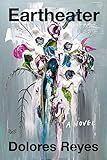 Here’s what Publishers Weekly had to say about Eartheater: “A high school dropout reluctantly uses her clairvoyant power to find missing women and children in Argentinian writer Reyes’s lurid debut. The unnamed narrator develops a habit of eating dirt in the wake of her mother’s violent death, earning her the name Eartheater and shame for her family, especially the aunt now raising her and her older brother, Walter. When a beloved teacher goes missing, the young teenage narrator eats the dirt from the school’s courtyard and draws an explicit picture of the teacher’s body outside of a nightclub, which gets her sent to the principal. After the teacher’s body is discovered where the narrator drew her, the aunt leaves the siblings to fend for themselves, and the narrator drops out of school while Walter supports them both by working as a mechanic. The narrator prefers to drink beer and play video games with Walter and his friends from their unnamed barrio, and occasionally accepts cash for her visions from family members of missing people. Reyes crafts an alluring, unsettling edge to the plot developments, including the narrator’s first sexual experiences and the city’s pervasive violence, by collapsing the narrator’s age and the passage of time, preserving aspects of her young girlhood and her angst-ridden teenage years as she grows older. Reyes’s coming-of-age portrait stands out for her unflinching look at a teen’s exploration of sex and death.”
Here’s what Publishers Weekly had to say about Eartheater: “A high school dropout reluctantly uses her clairvoyant power to find missing women and children in Argentinian writer Reyes’s lurid debut. The unnamed narrator develops a habit of eating dirt in the wake of her mother’s violent death, earning her the name Eartheater and shame for her family, especially the aunt now raising her and her older brother, Walter. When a beloved teacher goes missing, the young teenage narrator eats the dirt from the school’s courtyard and draws an explicit picture of the teacher’s body outside of a nightclub, which gets her sent to the principal. After the teacher’s body is discovered where the narrator drew her, the aunt leaves the siblings to fend for themselves, and the narrator drops out of school while Walter supports them both by working as a mechanic. The narrator prefers to drink beer and play video games with Walter and his friends from their unnamed barrio, and occasionally accepts cash for her visions from family members of missing people. Reyes crafts an alluring, unsettling edge to the plot developments, including the narrator’s first sexual experiences and the city’s pervasive violence, by collapsing the narrator’s age and the passage of time, preserving aspects of her young girlhood and her angst-ridden teenage years as she grows older. Reyes’s coming-of-age portrait stands out for her unflinching look at a teen’s exploration of sex and death.”
Here Is the Beehive by Sarah Crossan
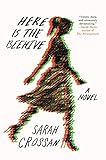 Here’s what Publishers Weekly had to say about Here Is the Beehive: “In Irish writer Crossan’s beautifully written first adult novel (after the YA book Being Toffee), a married London lawyer and mother of two has an affair with her client, Connor Mooney, a married father of three. Ana finds her husband, Paul, to be ‘homely’ and ‘compassionate,’ and feels unsatisfied in their marriage, which mostly consists of communicating by ‘grunts and nods.’ Ana and Connor meet up in hotel rooms when they can, but Ana wants more from the relationship; while she is willing to give up her family for Connor, he’s hesitant to leave his wife. The three-year affair ends with Connor’s death, the cause of which is initially kept from the reader. Ana hears the news from the unsuspecting Rebecca, who calls to inform Ana in her capacity as the lawyer of Connor’s estate. Ana is devastated and unable to mourn her lover openly, and is left with nothing but a password-protected photograph of him on her computer. Then she secretly changes Connor’s will and declares herself the executor, ‘so I could know your life and befriend your wife and keep you for a while.’ The book, structured in five parts, explores Ana’s grief, guilt, and loss in stunning, spare lyrical prose, which appears like verse on the page as dialogue breaks into snippets of Ana’s consciousness. Told from the point of view of a highly flawed Ana, this mesmerizing story will have readers hooked.”
Here’s what Publishers Weekly had to say about Here Is the Beehive: “In Irish writer Crossan’s beautifully written first adult novel (after the YA book Being Toffee), a married London lawyer and mother of two has an affair with her client, Connor Mooney, a married father of three. Ana finds her husband, Paul, to be ‘homely’ and ‘compassionate,’ and feels unsatisfied in their marriage, which mostly consists of communicating by ‘grunts and nods.’ Ana and Connor meet up in hotel rooms when they can, but Ana wants more from the relationship; while she is willing to give up her family for Connor, he’s hesitant to leave his wife. The three-year affair ends with Connor’s death, the cause of which is initially kept from the reader. Ana hears the news from the unsuspecting Rebecca, who calls to inform Ana in her capacity as the lawyer of Connor’s estate. Ana is devastated and unable to mourn her lover openly, and is left with nothing but a password-protected photograph of him on her computer. Then she secretly changes Connor’s will and declares herself the executor, ‘so I could know your life and befriend your wife and keep you for a while.’ The book, structured in five parts, explores Ana’s grief, guilt, and loss in stunning, spare lyrical prose, which appears like verse on the page as dialogue breaks into snippets of Ana’s consciousness. Told from the point of view of a highly flawed Ana, this mesmerizing story will have readers hooked.”
Nights When Nothing Happened by Simon Han
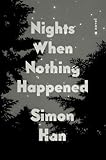 Here’s what Publishers Weekly had to say about Nights When Nothing Happened: “Han’s ambitious if mixed debut follows the travails of a Chinese immigrant family living in the wealthy Dallas suburb of Plano. Patty Cheng is the breadwinner, whose long hours designing microchips pulls her away from her photographer husband, Liang, and their two children, Jack and Annabel, 11 and five. On Thanksgiving Day in 2003, a misunderstanding leads to an accusation by Annabel’s best friend of a ‘bad touch’ by Liang, which snowballs into more trouble for Liang involving the police after Liang and Jack neglect to set the record straight. The family’s survival is dependent on a slippery sense of identity and difficulty in belonging in the Texas suburb, which permeate the narrative amid other unfortunately underdeveloped themes (duty vs. love, genteel racism). Most of the characterizations are convincing, though Annabel, even in close third-person narration, comes across as overly precocious (‘If Annabel could understand what an overreaction was, she could understand what an overreaction wasn’t’). Still, as Liang struggles through the consequences of the accusation, Han succeeds in drawing the portrait of a new American family while demonstrating a talent for creating a sense of place through the eyes of immigrants. The premise is intriguing, but Han doesn’t quite stick the landing.”
Here’s what Publishers Weekly had to say about Nights When Nothing Happened: “Han’s ambitious if mixed debut follows the travails of a Chinese immigrant family living in the wealthy Dallas suburb of Plano. Patty Cheng is the breadwinner, whose long hours designing microchips pulls her away from her photographer husband, Liang, and their two children, Jack and Annabel, 11 and five. On Thanksgiving Day in 2003, a misunderstanding leads to an accusation by Annabel’s best friend of a ‘bad touch’ by Liang, which snowballs into more trouble for Liang involving the police after Liang and Jack neglect to set the record straight. The family’s survival is dependent on a slippery sense of identity and difficulty in belonging in the Texas suburb, which permeate the narrative amid other unfortunately underdeveloped themes (duty vs. love, genteel racism). Most of the characterizations are convincing, though Annabel, even in close third-person narration, comes across as overly precocious (‘If Annabel could understand what an overreaction was, she could understand what an overreaction wasn’t’). Still, as Liang struggles through the consequences of the accusation, Han succeeds in drawing the portrait of a new American family while demonstrating a talent for creating a sense of place through the eyes of immigrants. The premise is intriguing, but Han doesn’t quite stick the landing.”
Lord the One You Love Is Sick by Kasey Thornton
 Here’s what Publishers Weekly had to say about Lord the One You Love Is Sick: “Thornton’s brutal, moody debut collection crafts a tapestry of hidden secrets and cruel undercurrents in rural Bethany, N.C., revolving around the heroin overdose of troubled 23-year-old Gentry. ‘I Shall Not Wait’ picks up with Gentry’s lifelong best friend, Dale, a cop who abandoned his drug-dependent buddy, whose decline seemed unstoppable, ‘like a train barreling toward the weak spot in the tracks.’ Dale becomes psychologically unmoored by the guilt, while his wife wonders if their marriage will survive. ‘Valley of the Shadow’ follows Gentry’s mother, Nettie, following Gentry’s death. She’s angry and in mourning, left alone with her agoraphobic younger son, Ethan, who’d bonded over video games with Gentry. In ‘Trespasses,’ Ethan finds a new friend in Abigail, a neighbor who’s been sexually abused by her father. More characters unravel with each successive story, which chronicle the deep and sprawling impact made by Gentry’s death as inner lives are exposed, unlikely friendships are forged, and gossipy whispers persist at the local diner. Thornton taps the vernacular, attitudes, and prejudices of small Southern townsfolk with eerie precision. These stories collectively coalesce into a resonant, emotionally searing nexus of hard truths, buried secrets, and emotional pain that readers won’t soon forget. Thornton’s accomplished stories are full of insights on their rural American setting and inhabitants’ psychology.”
Here’s what Publishers Weekly had to say about Lord the One You Love Is Sick: “Thornton’s brutal, moody debut collection crafts a tapestry of hidden secrets and cruel undercurrents in rural Bethany, N.C., revolving around the heroin overdose of troubled 23-year-old Gentry. ‘I Shall Not Wait’ picks up with Gentry’s lifelong best friend, Dale, a cop who abandoned his drug-dependent buddy, whose decline seemed unstoppable, ‘like a train barreling toward the weak spot in the tracks.’ Dale becomes psychologically unmoored by the guilt, while his wife wonders if their marriage will survive. ‘Valley of the Shadow’ follows Gentry’s mother, Nettie, following Gentry’s death. She’s angry and in mourning, left alone with her agoraphobic younger son, Ethan, who’d bonded over video games with Gentry. In ‘Trespasses,’ Ethan finds a new friend in Abigail, a neighbor who’s been sexually abused by her father. More characters unravel with each successive story, which chronicle the deep and sprawling impact made by Gentry’s death as inner lives are exposed, unlikely friendships are forged, and gossipy whispers persist at the local diner. Thornton taps the vernacular, attitudes, and prejudices of small Southern townsfolk with eerie precision. These stories collectively coalesce into a resonant, emotionally searing nexus of hard truths, buried secrets, and emotional pain that readers won’t soon forget. Thornton’s accomplished stories are full of insights on their rural American setting and inhabitants’ psychology.”
The Orchard by David Hopen
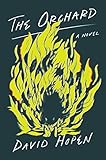 Here’s what Publishers Weekly had to say about The Orchard: “Hopen commingles religious philosophy and dangerous behavior in his ambitious debut. Aryeh, 17, has always felt somewhat alienated from his deeply devout orthodox Jewish community in Brooklyn’s Borough Park, so when his father’s job loss prompts a family move to southern Florida, Aryeh welcomes the opportunity to start over for senior year. He lands a coveted spot at elite Kol Neshama Academy, a modern Orthodox school whose students will undoubtedly drive their luxury cars all the way to the Ivy League. Despite his unfashionable attire and lack of social and academic sophistication, Aryeh is taken under the wing of the school’s golden boy, Noah. Noah’s risk-taking circle of friends in turn introduce Aryeh (soon redubbed Andrew) to the pleasures of secular life. Aryeh is especially fascinated by charismatic, emotionally complicated Evan, who has an emotional hold over Aryeh’s love interest, Sophia, and the group test their faith with daring escapades such as midnight speedboat rides (‘if you’re the worthy one, you survive,’ Evan says, fast approaching a jetty). Later, experiments with LSD bring on visions of God. Aryeh’s insecurities and longings are on full display in his insightful—if at times overwrought—narration. Though the students’ lengthy philosophical and scriptural debates initially seem ponderous, their thematic connections become increasingly apparent as the novel nears its moving climax. This isn’t your average campus novel, and despite its lumps, is all the better for it.”
Here’s what Publishers Weekly had to say about The Orchard: “Hopen commingles religious philosophy and dangerous behavior in his ambitious debut. Aryeh, 17, has always felt somewhat alienated from his deeply devout orthodox Jewish community in Brooklyn’s Borough Park, so when his father’s job loss prompts a family move to southern Florida, Aryeh welcomes the opportunity to start over for senior year. He lands a coveted spot at elite Kol Neshama Academy, a modern Orthodox school whose students will undoubtedly drive their luxury cars all the way to the Ivy League. Despite his unfashionable attire and lack of social and academic sophistication, Aryeh is taken under the wing of the school’s golden boy, Noah. Noah’s risk-taking circle of friends in turn introduce Aryeh (soon redubbed Andrew) to the pleasures of secular life. Aryeh is especially fascinated by charismatic, emotionally complicated Evan, who has an emotional hold over Aryeh’s love interest, Sophia, and the group test their faith with daring escapades such as midnight speedboat rides (‘if you’re the worthy one, you survive,’ Evan says, fast approaching a jetty). Later, experiments with LSD bring on visions of God. Aryeh’s insecurities and longings are on full display in his insightful—if at times overwrought—narration. Though the students’ lengthy philosophical and scriptural debates initially seem ponderous, their thematic connections become increasingly apparent as the novel nears its moving climax. This isn’t your average campus novel, and despite its lumps, is all the better for it.”
The Best of Brevity, edited by Zoe Bossiere and Dinty W. Moore
 Here’s what Publishers Weekly had to say about The Best of Brevity: “In this marvelous, diverse anthology, Brevity editors Moore and Bossiere collect the literary journal’s best nonfiction pieces, none longer than 750 words. Readers will find some familiar names, including Roxane Gay and Jia Tolentino, but also gems from lesser-known writers. They include poets such as Diane Seuss, whose entry comprises a single run-on sentence capturing a parent’s fury and fatigue while dealing with a child’s drug addiction, and Lori Jakiela, who recalls a conversation in which her terminally ill mother argued with her about the fate of Lori’s soul while teaching her to make a nut-roll. Elsewhere, book reviewer Julie Hakim Azzam writes poignantly of Palestine as ‘a phantom limb that continues to send pain signals through the nerves.’ Among the fiction writers, Patricia Park reflects on Americans’ and North and South Koreans’ differing beauty standards, and Torrey Peters crafts a powerful found essay out of violent details from a 2014 report on transgender murder victims. Closing out the book, Bossiere and Moore include a list of additional recommended reading. This collection will be an asset to writing teachers and students, and a joy to essay fans.”
Here’s what Publishers Weekly had to say about The Best of Brevity: “In this marvelous, diverse anthology, Brevity editors Moore and Bossiere collect the literary journal’s best nonfiction pieces, none longer than 750 words. Readers will find some familiar names, including Roxane Gay and Jia Tolentino, but also gems from lesser-known writers. They include poets such as Diane Seuss, whose entry comprises a single run-on sentence capturing a parent’s fury and fatigue while dealing with a child’s drug addiction, and Lori Jakiela, who recalls a conversation in which her terminally ill mother argued with her about the fate of Lori’s soul while teaching her to make a nut-roll. Elsewhere, book reviewer Julie Hakim Azzam writes poignantly of Palestine as ‘a phantom limb that continues to send pain signals through the nerves.’ Among the fiction writers, Patricia Park reflects on Americans’ and North and South Koreans’ differing beauty standards, and Torrey Peters crafts a powerful found essay out of violent details from a 2014 report on transgender murder victims. Closing out the book, Bossiere and Moore include a list of additional recommended reading. This collection will be an asset to writing teachers and students, and a joy to essay fans.”
Before the Coffee Gets Cold by Toshikazu Kawaguchi (translated by Geoffrey Trousselot)
 Here’s what Publishers Weekly had to say about Before the Coffee Gets Cold: “Japanese playwright Kawaguchi’s evocative English-language debut is set in a tiny Tokyo café where time travel is possible. In four connected tales, lovers and family members take turns sitting in the chair that allows a person to travel back in time for only as long as it takes a single cup of coffee to cool. In ‘Husband and Wife,’ a nurse goes back in time to visit her husband before his Alzheimer’s erased her from his memory; in ‘The Sisters,’ a woman visits her younger sister, who died in an accident while trying to visit her, to apologize for not seeing her. Kawaguchi’s characters embark on lo-fi, emotional journeys unburdened by the technicalities often found in time travel fiction—notably, they are unable to change the present. The characters learn, though, that even though people don’t return to a changed present, they return ‘with a changed heart.’ Kawaguchi’s tender look at the beauty of passing things, adapted from one of his plays, makes for an affecting, deeply immersive journey into the desire to hold onto the past. This wondrous tale will move readers.”
Here’s what Publishers Weekly had to say about Before the Coffee Gets Cold: “Japanese playwright Kawaguchi’s evocative English-language debut is set in a tiny Tokyo café where time travel is possible. In four connected tales, lovers and family members take turns sitting in the chair that allows a person to travel back in time for only as long as it takes a single cup of coffee to cool. In ‘Husband and Wife,’ a nurse goes back in time to visit her husband before his Alzheimer’s erased her from his memory; in ‘The Sisters,’ a woman visits her younger sister, who died in an accident while trying to visit her, to apologize for not seeing her. Kawaguchi’s characters embark on lo-fi, emotional journeys unburdened by the technicalities often found in time travel fiction—notably, they are unable to change the present. The characters learn, though, that even though people don’t return to a changed present, they return ‘with a changed heart.’ Kawaguchi’s tender look at the beauty of passing things, adapted from one of his plays, makes for an affecting, deeply immersive journey into the desire to hold onto the past. This wondrous tale will move readers.”
Also on shelves this week: The Age of Skin by Dubravka Ugrešić (translated by Ellen Elias-Bursac) and Together in a Sudden Strangeness, edited by Alice Quinn.









